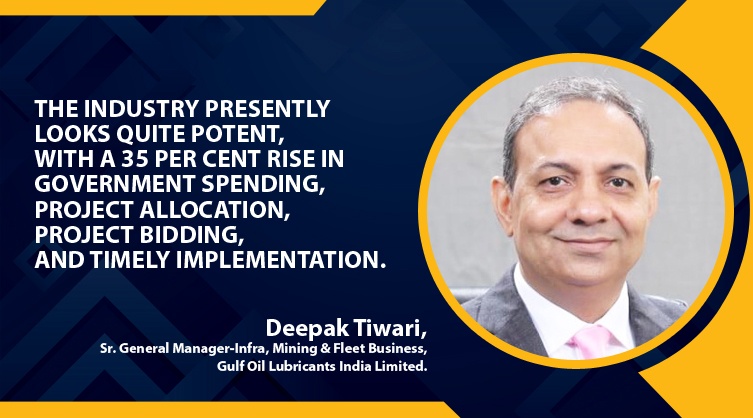Gulf Oil to focus on hydraulic applications for the total value chain
By Edit Team | July 11, 2022 11:33 am SHARE

Deepak Tiwari, Sr. General Manager-Infra, Mining & Fleet Business, Gulf Oil Lubricants India Limited in an interview with B2B Purchase
Gulf Oil has been in this market for more than one and a half decade and is skilled at establishing inroads and developing models that provide value to the industry. The model pattern begins with the creation of a niche area, the identification of pain points, and the creation of dependencies with our products and services. The design of survey synergies follows this to establish a long-term relationship, says Deepak Tiwari, Sr. General Manager-Infra, Mining & Fleet Business, Gulf Oil Lubricants India Limited.
Can you talk about your green initiatives?
Since we look at the entire value chain per se, we don’t look at the product alone. You simply cannot bring products and technology alone to our industry, which requires more of a collaborative and holistic approach. In construction equipment, we are moving to BS-IV. All our products are compatible. The world is going green, so we added AdBlue to keep up with the industry. For the most part, we have 100 per cent product grades ranging from engine oil to diesel engine oil hydraulics. We have been the ones to propel the industry ahead, and we haven’t waited for something like this to happen because we have solutions ready anytime a need develops in the market. As a company, we started focusing on hydraulics as a category to provide environmentally friendly hydraulic applications, products, and services. Keeping that in mind, we added AdBlue to our product line.
How do you look at the price volatility in the market?
For the past two years, there has been a steady increase in the prices of commodities like steel, cement, and labour, and we are no exception. It also considers two other variables: input costs and currency exchange rates. It’s not like B2C, where you may pass on price increases to the customer as they occur. Because we operate on a holistic basis, this becomes more difficult. For starters, we have a more efficient procurement system. Over time, we’ve been aggressively improving our formulations to stabilise the operation’s per unit cost. The third is, of course, introspection and customisation of our business to reduce service costs.
What are your business expectations for the next two years?
The industry is currently very robust, with a 35 per cent increase in government spending, project allocation, project bidding, and timely implementation. The government has devised a well-organised monitoring system for these projects, so we have numerous opportunities. Now that we’ve been in business for 14 years, we’re the market leaders with a 16–17 per cent market share. And, for the most part, roads have been our strong suit. We’re growing our crew. We are digitalising and exporting to Southeast Asia to improve our skills. We also support OEMs and other activities.
How was your participation experience at the last CII Excon?
Irrespective of all the disruption caused by the weather, we have had an excellent experience. We had around 14,000 plus visitors. We have witnessed multiple conferences and participated heavily in all the road shows, subsequently organising conferences. This has added significant value to the industry, the government, and society.
Cookie Consent
We use cookies to personalize your experience. By continuing to visit this website you agree to our Terms & Conditions, Privacy Policy and Cookie Policy.




































-20240213125207.png)

























